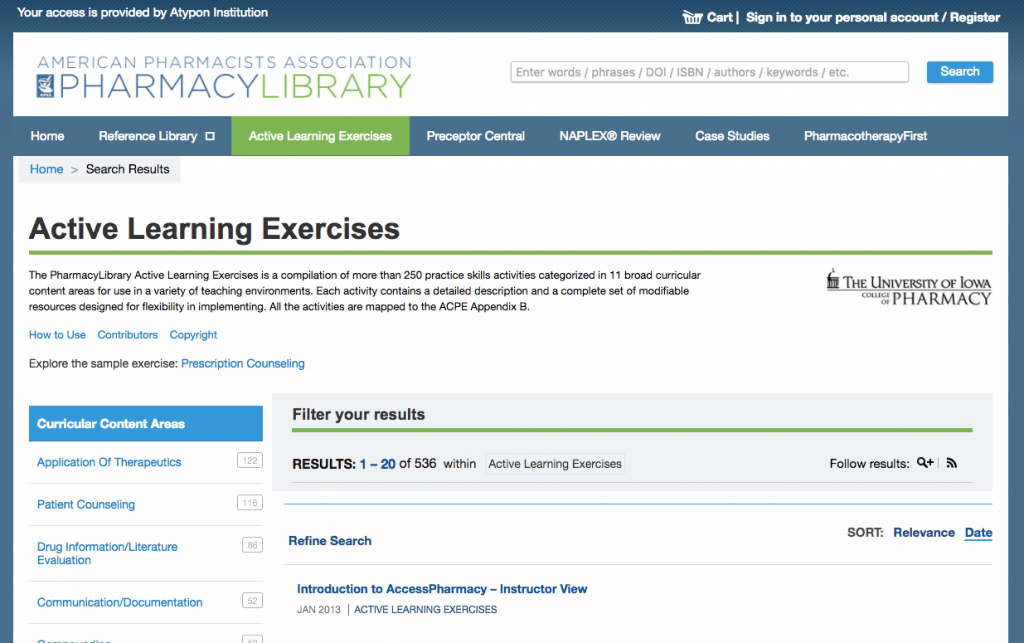An Integrated, Interactive Exams Module for the American Pharmacists Association’s New, Redesigned Website

Intro
The American Pharmacists Association’s PharmacyLibrary is a unique platform that hosts APhA’s extensive multimedia library of 44 pharmacy reference and technician training books, case studies, educational materials, high-resolution streaming videos, and board exam review tools for NAPLEX®, the North American Pharmacist Licensure Exam. The NAPLEX review has over 3,600 test questions spanning multiple chronic diseases from which users are able to create practice exams using custom criteria.
Challenge
APhA’s online publishing platform was custom built and inflexible. Adding content, making changes to the UI and UX, and editing NAPLEX test questions was a lengthy, awkward process that relied on the platform vendor and had to be handled offline. Additionally, with no integration to its association management system (AMS), APhA was unable to create special offers for its members. APhA desired a platform that would allow it to better manage its publishing content and provide user integration with its AMS.
Solution
Working together, APhA and Atypon designed a new PharmacyLibrary.com website and migrated it to Atypon Experience Platform, Atypon’s online publishing platform. The new site’s UI and UX were constructed with Atypon Page Builder, Atypon Experience Platform’s easy-to-use, drag-and-drop UX design tool. APhA is now able to make real-time additions and changes to PharmacyLibrary’s content.
The new PharmacyLibrary.com includes a custom-built interactive exams module for the NAPLEX review. Because the module enables customers to create individual user accounts, they can personalize practice exams by subject area, knowledge, competency-based questions, or NAPLEX competency area. A custom dashboard provides feedback on progress and remediation content suggestions to help students prepare for their licensing boards. The new exams module also gives institutional administrators granular, per-user data on site behavior, content usage, and even question difficulty, by tracking how many users answer a question correctly or incorrectly.
Atypon converted more than 3,600 test questions and images from APhA’s proprietary DTD to Digital Objects, an Atypon technology that allows any type of content to be assigned a DOI and share in all of Atypon Experience Platform’s features. A special Digital Objects editing interface enables APhA staff to amend test questions on the fly from within the platform.
Multiple taxonomies used to tag content semantically enhance search and onsite discovery (e.g., through search criteria with multiple facets) by chronic disease type, NAPLEX competency area, and question type. And Atypon created a single sign-on (SSO) integration with APhA’s AMS so customers can use their APhA login credentials to sign in to their personal account.
“Our new ability to capture user-level analytics and make changes to the site’s interface and content—including exam questions—is enabling us to respond more quickly to the changing needs of our users and to expand our content offerings. We are impressed by how quickly Atypon’s solution architects were able to incorporate these different technologies and create such a complex website from scratch.”
Results
Atypon Experience Platform’s easy-to-use UI/UX tools are giving APhA an unprecedented level of control over how its content is managed and displayed online.
The Atypon Experience Platform technology underlying the NAPLEX review module delivers new value to existing content and creates new revenue streams. Individual users can buy subscriptions to the site from a new customer store page, and Atypon Experience Platform’s easy-to-use interface allows APhA to quickly create and update offers based on business intelligence. And PharmacyLibrary staff can customize the content and offers displayed based on the identity of the user: student, faculty, or society member.
APhA’s new ability to capture user-level analytics and make changes to the site’s interface and content—including exam review questions—enables them to respond more quickly to the changing needs of their users and expand content offerings based on evidence-based business intelligence.






